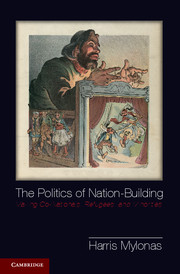Book contents
- Frontmatter
- Contents
- List of Figures, Maps, Tables, Graph, and Illustrations
- Acknowledgments
- List of Abbreviations
- Preface
- 1 Introduction
- Part I Theory
- 2 The International Politics of Assimilation, Accommodation, and Exclusion
- Part II Empirical Evidence
- Methodological Appendix
- References
- Author Index
- Historical Name Index
- Subject Index
2 - The International Politics of Assimilation, Accommodation, and Exclusion
Published online by Cambridge University Press: 05 January 2013
- Frontmatter
- Contents
- List of Figures, Maps, Tables, Graph, and Illustrations
- Acknowledgments
- List of Abbreviations
- Preface
- 1 Introduction
- Part I Theory
- 2 The International Politics of Assimilation, Accommodation, and Exclusion
- Part II Empirical Evidence
- Methodological Appendix
- References
- Author Index
- Historical Name Index
- Subject Index
Summary
Three hundred years ago, the existence of a state did not necessarily presuppose any national sentiments among the population. Other forms for legitimizing authority – cultivating the belief that the governing institutions have the right to rule – were prevalent around the world. States existed long before the age of nationalism, but only during the past two hundred years has the cultivation of nationalistic sentiments become an important part of an increasing number of political leaders’ repertoire for establishing order and securing sovereignty within their borders. Since the rise of nationalism as an organizing principle of political communities, national sentiments have countered dissent (including the evasion of conscription), enhanced the taxing abilities of states, fostered compliance with the laws, and prevented separatist movements. However, these same nationalist sentiments have also led to inter- and intrastate conflict, the deaths of many civilians, population displacements, and even genocide.
Legitimate authority in modern national states is connected to popular rule, to majorities. Nation-building is the process through which these majorities are constructed. In this context, foreign powers that want to destabilize a state attempt to undermine its legitimacy by encouraging and nurturing linguistic, ethnic, or religious differences and regional identities within its borders. Thus, governing elites see benefit in harmonizing the political and the national units through the construction and propagation of a common national identity among the population of their state. Now, how do ruling political elites decide who to assimilate, who to accommodate, and who does not belong in their state?
- Type
- Chapter
- Information
- The Politics of Nation-BuildingMaking Co-Nationals, Refugees, and Minorities, pp. 17 - 50Publisher: Cambridge University PressPrint publication year: 2013
- 1
- Cited by

